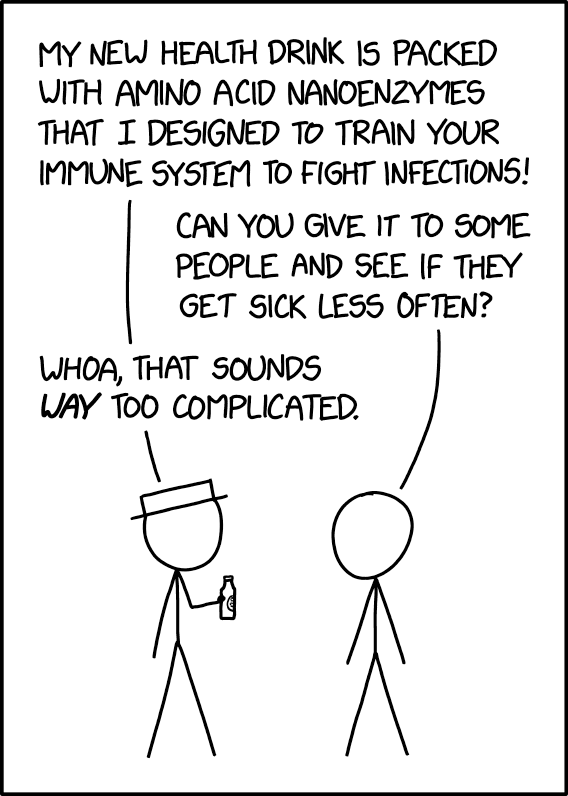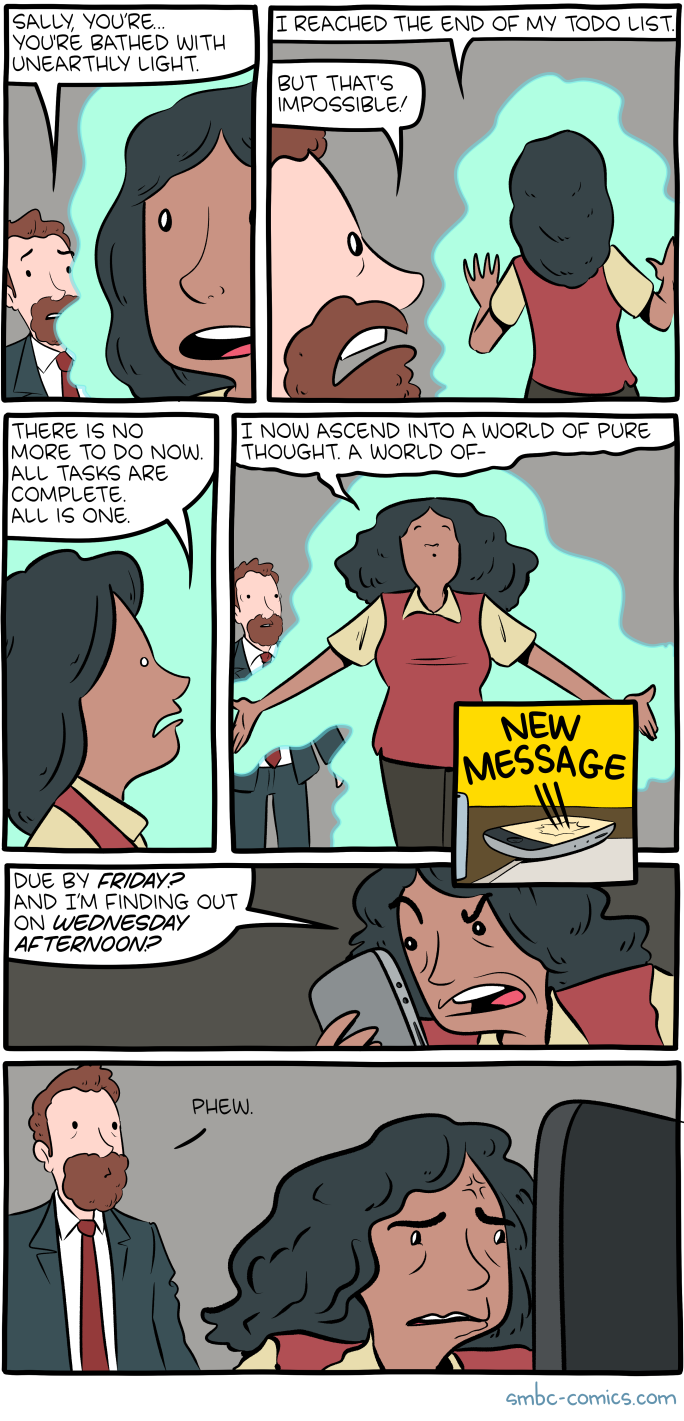Sunday, 12 September 2021 - 7:46am
This fortnight, I have been recovering from surgery, tearing through my RSS backlog, and mostly reading:
- Thought for the day — Digby's Hullabaloo:

- Coming in 2040: No Future, the First Punk Rock Nursing Home — Lisa Borders at McSweeney's:
Do the seniors in your life sneer at the idea of decorum? Spit at the mention of Rupert Murdoch, and go into an anti-Reagan rant like it’s 1984 and they’re canvassing for Mondale? Do they insist that none of the good music in the ’80s was played on the radio, except for college radio? Have you found old photos of Grandma when she was 20 wearing Doc Martens, ripped fishnet stockings, and a miniskirt? If you answered “yes” to any of the above, then No Future might be just the place for your elders to rock out their sunset years. Staffed almost entirely by the love children of Henry Rollins, we’re opening our doors in 2040 at this first-of-its-kind facility. From the moment you walk in, you’ll see the difference. Gone are the floral wallpaper borders, the fake oak wainscoting, the lingering scent of Febreze and death you’ll notice in other elder care facilities. We’ve designed No Future to resemble a warehouse squat, the kind in which your loved one likely attended many a gig. Our thin Berber carpeting was custom-ripped, cigarette-burned, and beer-soaked for maximum authenticity.
- Hayek’s Bastards: The Populist Right’s Neoliberal Roots — Quinn Slobodian in Tribune:
Both neoliberals and the new right scorn egalitarianism, global economic equality, and solidarity beyond the nation. Both see capitalism as inevitable and judge citizens by the standards of productivity and efficiency. Perhaps most strikingly, both draw from the same pantheon of heroes. A case in point is Hayek himself, who is an icon on both sides of the neoliberal-populist divide. Speaking alongside Marine Le Pen at the party congress of the French National Front in 2018, self-described populist Steve Bannon condemned the ‘establishment’ and the ‘globalists’ yet built his speech around Hayek’s own metaphor of the road to serfdom, invoking the authority of the master’s name
- Good Morning, I.. WHOA! Uuh, I'll Come Back - Grant Hojohn — Phil Are Go!:

- The Roots of White Evangelicalism’s Crisis Are in White Evangelical Churches, Not Republican Politics — Jesse Curtis in Religion Dispatches:
Within a decade of Jim Crow’s demise, the hottest trend in white evangelical church startups taught that racial diversity in local churches threatened church growth. An influential cadre of white evangelical professors and mission theorists centered at Fuller Seminary assured a new generation of pastors that homogeneous congregations allowed worshippers to feel at home with “Our Kind of People” —i.e. white people—and facilitated healthy church growth. Race was a matter of pragmatism rather than justice; merely a tool that could be used to expand the evangelical coalition. They insisted this had nothing to do with the bad old days of segregation. They were merely finding the most effective ways to spread the gospel. Black evangelical pastors such as Clarence Hilliard warned that a theology of church growth that focused on homogeneous congregations and a personal ticket to heaven was quietly forming deep habits of selfishness in a racist society. It was 1976, and Hilliard wasn’t critiquing the Christian Right, because it didn’t exist. He was warning about what white evangelicals were learning in their own churches.
- Robodebt: A multi-layered policy failure — Peter Whiteford in Progress in Political Economy (PPE):
The Robodebt fiasco involves policy failures across numerous dimensions. The most obvious – and in many ways the least important failure – is that it failed to achieve the budgetary savings that were its main objective. A more important failure is that the Australian government decided to act unlawfully. This was compounded by the failure of the administrative procedures of government to identify and prevent these unlawful acts. Even more seriously, hundreds of thousands of people were adversely affected. This human cost is difficult to assess and involves much more than financial losses. Just over 2,000 people who had received a Robodebt notice between July 2016 and October 2018 died during that period, although in the absence of an official coroner’s report, no causes can be attributed. However, it has been noted that from January 2017, Centrelink began tweeting the contact number for Lifeline, the national charity providing 24-hour support and suicide prevention services.
- This Modern World — by Tom Tomorrow:

- U.S. Military Training Document Says Socialists Represent “Terrorist” Ideology — Ken Klippenstein in the Intercept:
A Navy counterterrorism training document obtained exclusively by The Intercept appears to conflate socialists with terrorists and lists the left-wing ideology alongside “neo-nazis.” A section of the training document subtitled “Study Questions” includes the following: “Anarchists, socialists and neo-nazis represent which terrorist ideological category?” The correct answer is “political terrorists,” a military source briefed on the training told me. The document, titled “Introduction to Terrorism/Terrorist Operations,” is part of a longer training manual recently disseminated by the Naval Education Training and Command’s Navy Tactical Training Center in conjunction with the Center for Security Forces. The training is designed for masters-at-arms, the Navy’s internal police, the military source said.
- Essentialism and Traditionalism in Academic Research — Ryan Kyger and Blair Fix:
‘Essentialism’ is the view that behind real-world objects lie ‘essences’ — a type of eternal category that you cannot observe directly but is nonetheless there. Racial categories are a common type of ‘essence’. To be racist is to attribute to different groups universal qualities that define them as people. Given the long history of racism, it’s clear that humans need little impetus to impose categories onto the world. Still, our instinct to categorize is not always bad. In fact, it’s a key part of science. Looking for patterns is how Dmitri Mendeleev created the periodic table. It’s how John Snow discovered that cholera was water-borne. And it’s how Johannes Kepler discovered the laws of planetary motion. So if categorizing patterns can be helpful, what makes essentialism bad? To be essentialist, in our view, is to reify a category (or theory) into a ‘higher truth’. By so doing, you don’t use evidence to inform a theory. You use theory to interpret evidence … and you don’t consider that you could be wrong.
- Health Drink — xkcd:

- The Horrifying Rise Of Total Mass Media Blackouts On Inconvenient News Stories — Caitlin Johnstone:
Two different media watchdog outlets, Media Lens and Fairness & Accuracy In Reporting (FAIR), have published articles on the complete blackout in mainstream news institutions on the revelation by Icelandic newspaper Stundin that a US superseding indictment in the case against Julian Assange was based on false testimony from diagnosed sociopath and convicted child molester Sigurdur Thordarson. […] “We have not found a single report by any ‘serious’ UK broadcaster or newspaper,” says the report by Media Lens. “But in a sane world, Stundin’s revelations about a key Assange witness — that Thordarson lied in exchange for immunity from prosecution — would have been headline news everywhere, with extensive media coverage on BBC News at Six and Ten, ITV News, Channel 4 News, front-page stories in the Times, Telegraph, the Guardian and more.”
- Saturday Morning Breakfast Cereal — by Zach Weinersmith:
